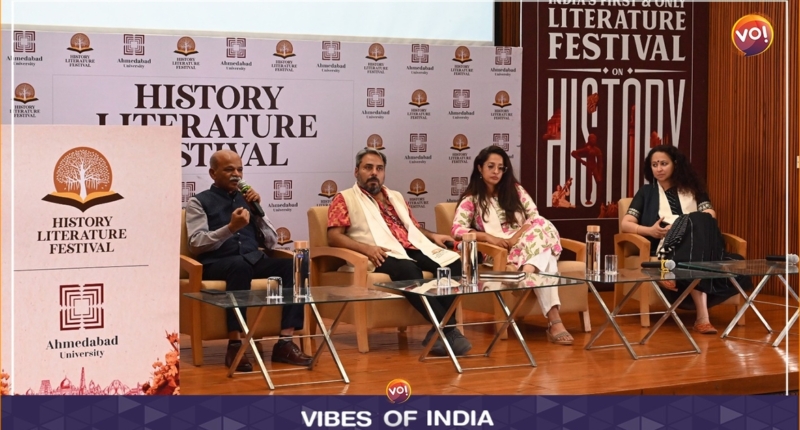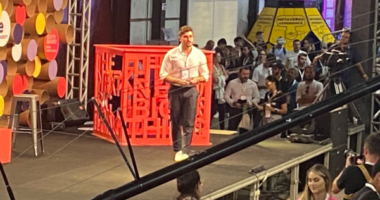Archaeologist and author Vasant Shinde revealed that all South East Asians are descended from the Harappan civilization. He believes this data can unite the nation. However, many attendees at the History Literature Festival (HLF) remained skeptical. In response, Disha Ahluwalia stated that archaeology is a physical science with little room for misinterpretation. On the topic of British rule, Professor Amar Farooqui of Delhi University stated that the assessment of British rule’s impact should not solely focus on the railways, postal system, and modern political institutions, as they are the hallmarks of any modern state. The HLF also featured discussions on language standardization, the Modi script, and the rise of the pharmaceutical industry. Peggy Mohan argued that India should follow Iceland’s example and make it a political decision to standardize local languages. Historian Prachi Deshpande spoke of the standardization of languages since the Middle Ages, while also discussing the Modi script’s revival. The HLF also pondered speculative questions, such as what might have happened if India had liberalized the economy in the 1960s.
Descendants of Harappan Civilization Can Unite South East Asians, Says Archaeologist
According to recent findings by scientists who analyzed samples from archaeological sites, all South East Asians are believed to be descendants of the Harappan civilization. This discovery has led archaeologist and author Vasant Shinde, who played a significant role in the excavation of Harappan sites like Rakhigarhi in Haryana, to believe that it can unite the nation.
Speaking at the History Literature Festival (HLF) at Ahmedabad University, Dr. Shinde pointed out that all Hindus and Muslims in India have the same DNA. Any physical variations among the people in India are due to food, climate, and ethnic mixing with other groups from Iran and Africa.
Dr. Shinde is the founding Director General of the National Maritime Heritage Complex in Gandhinagar and a former vice-chancellor of Deccan College, Pune. He believes that Harappans were non-violent people who practiced meditation and yoga. Despite criticism of his findings as favoring the BJP ideology, he insisted that his findings were based solely on scientific data.
During the same session, panelists discussed the importance of keeping the story real and guarding against misinterpretation of data. Archaeologist Disha Ahluwalia, who is currently working at the Rakhigarhi site, stated that archaeology is a physical science that does not leave much room for misinterpretation. Each time an excavation takes place, there is a specific research agenda. Currently, researchers are trying to understand land use patterns.
Tana Trivedi, a fellow panelist who teaches business history at Ahmedabad University and is currently archiving the papers of Prabhashankar Pattani, the late divan of the princely state of Bhavnagar, emphasized the importance of cross-checking and verifying facts. She provided an example from her own research about Sundarji Saudagar, a 19th-century horse trader of Kutch who bought horses from Afghanistan for the British, who used them in their battle against Tipu Sultan in Mysore. She found a passing mention of the same Sundarji in another, wholly different paper, which helped verify the story.
Professor Trivedi also discussed how princely states provided scholarships for students to study at the world’s best universities in the 1920s. For example, Bhavnagar state sent students to MIT, with the idea that they would return and contribute to the nation-building process upon their return.
In conclusion, Dr. Shinde’s findings could provide a way to unite South East Asians who share a common Harappan ancestry. With archaeological evidence indicating that regional variations in physical appearance in India are due to food, climate, and ethnic mixing, it is important to rely on scientific data and cross-checking facts to avoid misinterpretation.
Discussions on India’s History and Political Structure at the History Literature Festival
The Pattani archives contain documents that reveal discussions on federalism as a political structure for independent India. Professor Trivedi commented that if federalism had been adopted, India would have remained a dominion with no clean break from British rule. During the panel discussions at the History Literature Festival (HLF), many imaginative “what if” scenarios were discussed, such as what might have happened if the Marathas had not fought the Battle of Panipat and stayed below the river Chambal. Professor Chinmay Tumbe of IIMA speculated that West and East Pakistan would have been joined by a swath of territory in the Indo-Gangetic belt.
The British rule is credited with giving India railways, a postal system, and modern political institutions, but Professor Amar Farooqui of Delhi University said that this would be a strange way to assess the effects of British rule. He explained that there is nothing particularly British about these things, and they are the hallmarks of any modern state.
During the session on “The Tale of Two Empires: The Maratha and the British,” panelists compared the Marathas to the British, with Uday Kulkarni, author of “The Maratha Century,” arguing that historians have unfairly brushed aside the Marathas. He emphasized that the Maratha century saw power shift from the king to the prime minister and finally to the army generals, which the British exploited. Kulkarni added that the Maratha contribution to the country is considerable, and while they followed a scorched earth policy in the East, they never indulged in senseless massacres.
In the session on “A People’s History of Language,” the panellists discussed the death of multilinguality and small languages. Moderator Rahul Sarwate of Ahmedabad University pointed out that in their time, Vinoba Bhave knew 16 languages and Mahatma Gandhi knew 10, but today, most people are content knowing one. The panelists also debated whether it is possible to save Indian languages from the onslaught of English and whether it is practical to teach engineering and medicine in the local language.
Overall, the HLF raised several interesting points and perspectives on India’s history and political structure, including how different scenarios could have impacted the country’s present-day. The discussions also highlighted the need for cross-checking and verifying facts to avoid misinterpretation of data.
India’s Languages and Their Ties to Politics
During the session on “A People’s History of Language” at the History Literature Festival, Peggy Mohan, the author of Wanderers, Kings, Merchants: The Story of India Through Its Languages, discussed the importance of language in India. She explained that if a small country like Iceland has been successful in preserving its language, there is no reason India cannot do the same. She believes that not knowing English in India means being cut off from technology, which highlights the need to prioritize preserving Indian languages.
Mohan added that language is tied to politics, just as Persian was the high language of the Mughals, who came from Uzbekistan, and the Uzbek language was completely dumped. She also pointed out that sometimes an old language has to die, and propping up languages out of sentimentality can have political repercussions.
Historian Prachi Deshpande, who teaches at the Centre for Studies in Social Sciences, Kolkata, discussed the standardization of languages, which has been seen from the Middle Ages to Modern times. She explained how the Modi script was used by the business class for keeping accounts, but it was illegible to outsiders, and a small group of scribes had control over it. The British killed it because they could not interpret it. However, now there is a revival with many young scholars interested in learning it.
In conclusion, the panelists emphasized that language and politics are intertwined, and standardizing languages can lead to uniformity, while people on the ground may talk differently. Despite the challenges, preserving and reviving languages is critical to India’s cultural heritage and can have significant political implications.
Speculative Questions at the HLF
The panelists at the HLF also discussed several speculative questions about India’s history and modern-day implications. For example, during the session on “The Tale of Two Empires: The Maratha and the British,” Professor Chinmay Tumbe of IIMA speculated on what might have happened if the Marathas had not fought the Battle of Panipat and stayed below the river Chambal. He suggested that West and East Pakistan would have been joined by a swath of territory in the Indo-Gangetic belt.
Similarly, during the session on “Science & Technology and the Making of Modern India,” the panelists discussed the rise of the pharmaceutical industry, the Nutan Stove, and the portrayal of scientists in OTT serials like Rocket Boys. They also speculated on what might have happened if India had liberalized its economy in the 1960s instead of the 1990s. According to author Dinesh C Sharma, India could have become an outsourced manufacturing hub like China is today.
Overall, the HLF raised several speculative and thought-provoking questions about India’s history and modern-day implications, highlighting the need for cross-checking and verifying facts to avoid misinterpretation of data.
Don’t miss interesting posts on Famousbio










